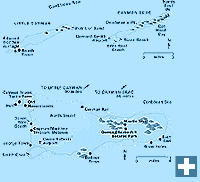|
 |
 The
The Cayman Islands which comprise three islands in the Caribbean Sea south of Cuba, is a British Dependent Territory originally discovered by Christopher Colombus. The
The Cayman Islands which comprise three islands in the Caribbean Sea south of Cuba, is a British Dependent Territory originally discovered by Christopher Colombus.
The Cayman Islands is the world leading offshore financial centre. There are more than 485 banks, 4,300 investment funds and 600 insurance companies licensed or otherwise regulated in the Cayman Islands. All the main international accounting firms are present and there are numerous high quality law firms. In 1997 Caymans established its own Stock Exchange. The reputation and popularity of the Caymans has increased significantly, particularly in Asia, as it is one of only two offshore centres approved by the Hong Kong Stock Exchange for public listings in Hong Kong.
Communications and transport are excellent with regular flights from Miami, USA which is only one hour away. |
|
 Top
Top |
 |
The governing legislation is the Companies Law, Cap.22 (as revised and amended) (the "Companies Law") of the Cayman Islands, which was originally modeled on the United Kingdom Companies Act, 1948 but has been modified over the years to accommodate the evolving requirements of international clients.
In addition to the Companies Law, other regulatory laws such as the Banks and Trust Companies Law, the Companies Management Law, the Insurance Law, the Money Services Law, the Mutual Funds Law and the Proceeds of Criminal Conduct Law (collectively, the "Regulatory Laws") contribute to the islands' status as the world leading financial centre.
There are three types of Cayman companies, the Ordinary Resident, the Exempted and the Non-resident. Amongst, the Exempted Company is the type of company which is widely used as offshore entity conducting business outside Cayman Islands.
The Cayman Islands received a Royal decree in 1798 that
they would be free from taxes forever and this decree
remains in force. All Exempted Companies receive a 20
year tax exemption certificate further enhancing their
tax exempt status.
The Cayman Islands received a Royal decree in 1798 that they would be free from taxes forever and this decree remains in force. All Exempted Companies are entitled to receive a 20 year tax exemption certificate which further enhance their tax exempt status.
In April 2001, the Cayman Islands issued new due diligence guidelines requiring disclosure of information of all directors, members, beneficial owners and authorized signatories of Cayman Islands companies to services providers. Such information is confidential, under the Confidential Relationship (Preservation) Law which makes it a criminal offence to divulge confidential information or to willfully obtain or attempt to obtain confidential information relating to a Cayman Islands company.
|
|
 Top
Top |
 |
Company
Names: Need not use "Limited" in their names. Chinese names are permitted with additional fees.
Registered Offices: Must have a registered office provided by a licenced trust or a company management company.
Directors: Must have at least one director and corporate directors are permitted. A copy of up to date Register of Directors containing names and addresses of directors must be filed at the Companies Registry but is not available for public inspection. Changes must be notified to the Registry within 30 days.
Shareholders: Should have at least one shareholder and whilst the corporate legislation does permit bearer shares, in practice they are not encouraged. Details of the beneficial owner must be disclosed to the corporate management company providing the registered office.
Meetings: Members Annual General Meeting is not required. A directors' meeting must be held each year in the Caymans and this is normally held by appointing local proxies to act.
Records: Minutes or Resolutions must be kept by each company and may be kept outside the Cayman Islands. An Annual Return must be lodged in January of each year but this does not disclose details of the directors or members. Copies of special resolutions must be filed with the Registry no later than 15 days after their passing. A copy of all special resolutions must be annexed to any copies of Articles of Association subsequently issued.
Accounts: Accounts do not need to be filed with the Registry. An audit is not required. |
|
 Top
Top |
|
|
